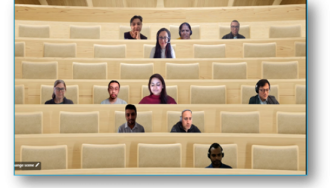Annual progress review conference wrap up
Our Annual Progress Review Conference was held 9-12 August 2021. Hear from current PhD student, Binod Rayamajhee who tells us about his experience and takeaways from the week-long online conference
Our Annual Progress Review Conference was held 9-12 August 2021. Hear from current PhD student, Binod Rayamajhee who tells us about his experience and takeaways from the week-long online conference

The Annual Progress Review (APR) conference held on 9-12 August 2021 has been a grand success. Every year, the APR conference offers an exciting opportunity for Higher Degree Research (HDR) students to showcase their exceptional research outcomes in front of others. Conference presentations are always rewarding and provide an excellent platform for students to enhance their communication skills and learn how to disseminate their findings in a better way. On top of it all, students can get new ideas on how their peers approach research questions to pitch new research ideas. The four-day review conference provided HDR students an opportunity to interact with a wide range of audiences including their peers, supervisors, academics, and clinicians who are experts in their respective fields. This ultimately enhanced rational thoughts and discussions through a publicly engaged question-answer session. I would like to take this opportunity to summarise and reflect on my experiences as a participant in this year’s APR conference.
Personally, I learned a lot about the cutting-edge multi-disciplinary research being conducted by HDR students at UNSW School of Optometry and Vision Science (SOVS) and came away each day with new knowledge at the frontier of science. The APR conference was moderated by UNSW SOVS Postgraduate Coordinator Associate Professor Maria Markoulli and was divided into five research areas: systematic disease of the eye, refractive error, low vision, and neurological disease, anterior eye, public health, and glaucoma, followed by panel interviews of presenters.
The conference commenced with important and informative studies on the anterior eye and ocular systematic diseases such as Jeremy Chiang’s study on “ocular nerve damage with cancer therapy”. Additionally, studies on compliance of contact lens wearers to save vision, host immune response to microbial keratitis, and the development of biomaterials against ocular infection were presented on the first day. The second day of the conference featured amazing talks relating to myopia, paediatrics, ocular trauma, corneal neural markers, and amblyopia. Mohammed Alnawmasi’s presentation on the “impact of traumatic brain injury on the visual system” underpinned an interactive discussion. Days three and four were highlighted by important talks on a wide range of studies related to the anterior eye and public health. I was inspired by each presentation on translational research. I felt fortunate to hear about ground-breaking studies on ocular homeostasis and immune regulation, age-related macular degeneration (AMD) and vision loss, probiotics and prebiotics on dry eye diseases, tear metabolites to defeat eye infection, contact lens associated corneal infection, meibomian glands changes, and dysfunction, the microbiome of Acanthamoeba, drug-resistant bacteria in ocular infection, sex hormone regulation of tear film production by meibomian glands, the impact of smoke on ocular health, eye care facilities in Australia for refugees, and eye care delivery in Australia.
The 2021 APR conference has been very engaging with audiences and conversations held in the chat room were also refreshing. During the four-day conference, I enlightened myself with the research work other colleagues are undertaking and am motivated to pitch time-tailored research plans. I really enjoyed this well-organised conference with noteworthy discussion sessions through interactive modules and I learned a lot about eye health research.
The APR conference also featured a presentation awards competition which is a part of each SOVS APR conference. Jeremy Chiang bagged the best presentation award for his talk on “in-vivo corneal confocal microscopy in chemotherapy-induced peripheral neuropathy” and Adam Samuels secured the runner-up title for his presentation on “improving the compliance of contact lens wearers to save vision”, congratulations to both winners. Thank you also to the UNSW Bookshop who annually donates a prize to our APR conference. We appreciate their continued support of our students and School.
Lastly, I would like to extend my big thanks to all who made this year’s APR a grand success amid the state-wide lockdown. A special mention to Postgraduate Coordinator Associate Professor Maria Markoulli, all supervisors, higher degree research students, Teaching Support Officer, Dr Anne Barnes, and Administrative Assistant Tommy Tran for their untiring efforts.